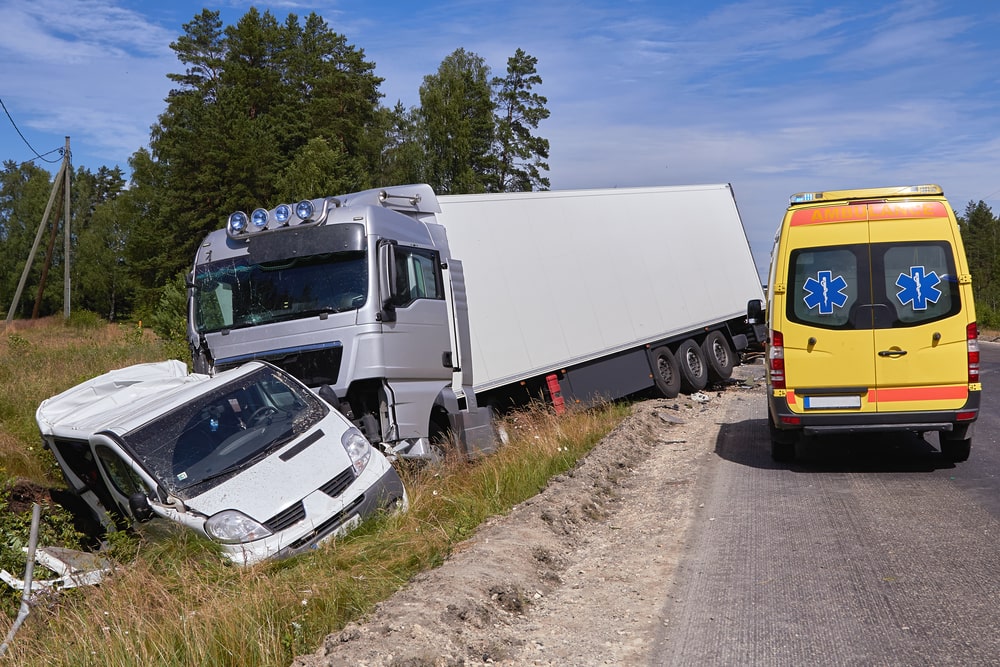Network Of Independent Truck Accident Attorneys
Massachusetts Truck Accident Laws
100% Committed To Maximizing Your Recovery
Massachusetts Truck Accident Laws

Massachusetts has specific laws in place to regulate the operation of large trucks on its roadways, aiming to reduce accidents and protect all drivers. The combination of federal regulations, state-specific rules, and local ordinances governs the way trucking companies and drivers must operate in the state. These laws also provide guidance on how liability is determined and what steps accident victims may need to take after a crash. For individuals involved in a truck accident, understanding these rules is essential when seeking compensation.
Trucking accidents are often more complex than regular car accidents due to the involvement of multiple parties, including the truck driver, the trucking company, and potentially even manufacturers of truck parts. Massachusetts truck accident laws make it clear that each of these parties may be liable under certain circumstances, depending on factors like the driver’s actions, the condition of the truck, and compliance with safety regulations.
Key Federal Regulations That Apply
The Federal Motor Carrier Safety Administration (FMCSA) sets nationwide standards for commercial trucking, and these regulations also apply in Massachusetts. One of the most critical regulations is the Hours of Service (HOS) rule, The FMCSA revised these regulations on June 1, 2020, to increase flexibility for drivers while maintaining safety. Key changes include expanding the short-haul exemption to 150 air miles with a 14-hour shift limit, allowing an additional 2 hours for driving during adverse conditions, requiring a 30-minute break after 8 hours of driving (not on-duty time), and modifying the sleeper berth rule to permit at least 7 hours in the berth and 2 off-duty hours to meet the 10-hour rest requirement. These changes took effect on September 29, 2020.
Massachusetts enforces FMCSA regulations and holds trucking companies accountable if they fail to follow these rules. For example, if a driver exceeds their allowed driving hours or falsified their driving log, both the driver and the trucking company may be found responsible for an accident. Truck Law understands how vital these federal regulations are in determining fault and recovering damages for victims of truck accidents.
Massachusetts-Specific Trucking Rules
In addition to federal guidelines, Massachusetts has its own state-specific regulations governing commercial trucks. These rules are designed to enhance safety on the state’s roadways. Some of the most critical state laws concern the weight limits for trucks, speed restrictions, and inspections.
Massachusetts law requires trucks to undergo regular inspections to ensure they are in proper working order. Any mechanical issues that are found must be repaired immediately, or the vehicle could be taken off the road. Trucks operating above the allowed weight limits are also subject to penalties, as overloading can contribute to mechanical failures and accidents. In cases where an accident is caused by a mechanical failure that should have been identified in a state-mandated inspection, Massachusetts truck accident laws hold the trucking company or truck owner liable.
These state rules work in conjunction with federal regulations to create a comprehensive framework aimed at reducing truck accidents. Visit the Massachusetts Department of Transportation website for more detailed information on state regulations.
Determining Liability In Truck Accidents
After a truck accident, determining who is responsible can be more challenging than in typical car accidents due to the number of parties involved. Massachusetts truck accident laws allow victims to pursue compensation from multiple parties if more than one contributed to the crash. For example, if a trucking company failed to maintain its fleet or violated state or federal laws, they could be held liable. Similarly, a truck manufacturer may be responsible if a defect in the truck or one of its parts caused the accident.
In Massachusetts, the concept of comparative negligence applies. This means that if an accident victim is found partially responsible for the crash, their compensation may be reduced based on their level of fault. However, as long as the victim is found to be less than 51% responsible for the accident, they are still eligible to recover damages.
Steps To Take After A Truck Accident
If you are involved in a truck accident in Massachusetts, taking immediate action can significantly impact the outcome of any legal case. Gathering evidence, such as photographs of the accident scene, witness statements, and police reports, is crucial. Medical documentation is also important, as it establishes the extent of injuries and helps demonstrate the impact of the accident on your life.
It’s also essential to contact a legal team familiar with Massachusetts truck accident laws. Our team at Truck Law can guide you through the process and help you understand your rights under the law.
Contact Us Today
If you or a loved one has been involved in a truck accident, it’s important to act swiftly. Massachusetts truck accident laws can be complex, and having the right legal support can make all the difference in securing fair compensation. Contact us today for a free consultation, and let’s discuss how we can help you move forward.